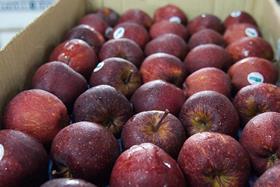
As India’s apple production moves into the Jammu and Kashmir season, opportunities are becoming apparent for imports on two fronts, according to local traders.
India’s apple season this year has been something of a roller-coaster ride. Initial expectations of a record-breaking crop for the country were beaten back in June by hailstorms in Himachal Pradesh, followed by heavy rain and a shortage of packaging material.
Small supply of small sizes
Late rains have meant the season’s size profile is leaning towards the large end of the scale, and the short supply of small apples is expected to become more pronounced going into Jammu and Kashmir’s harvest.
Demand for smaller sizes is strong on the domestic market, according to local traders, and the shortage in the Indian harvest is opening up opportunities for imports.
“Due to heavy rains, the size of the apples started looking good, as it was initially predicted at very small sizes,” Hitin Suri of Indian apple marketer Suri Agro Fresh told Fruitnet.com.
“Apples from Jammu and Kashmir have just started. The quality of the apples to date looks quite good and the size is also very good. Small size apples are very rare in Jammu and Kashmir…and demand for `those` smaller apples will persist.”
Hail dents season
Despite the flood of damaged fruit onto the market from Himachal Pradesh following June’s hailstorms, prices for both high and low quality apples have beaten all expectations.
“Hail-damaged apples from lower elevations started selling from US$14-16 `per carton`, and high-quality apples for US$20 plus,” said Mr Suri.
“The expected price by then was for hail-damaged apples US$8-10 `per carton` and high-quality apples US$12-14.”
Those high prices have been in part because of difficulties getting to market for much of the crop. The heavy rains that have bumped up apple sizes have also made picking difficult and churned up roads in production areas.
A shortage in packaging materials has also contributed to delays in the supply chain, meaning much of the harvest making it to the market has been overripe.
“When the fruit comes to market it is totally ripened or damaged, and the market prices `have been` totally slashed as the apples are totally rotten,” said Mr Suri.
“Fruits which were freshly packed were getting good prices, and the difference between overripened produce and fresh produce is very high – sometimes there is a difference of 300 per cent.”
New year opportunities
Mr Suri predicts that if the current rains lets up soon, the apple sector should be able to get enough fruit into storage to supply the local market until December/January.
But if rains continue that may not be the case, opening up greater opportunities for imports.
“Chinese Fuji apples are now so popular in India that they are regular in demand around the year, and they have shown they have their own independent share of the market,” he said.
“American apples will be in demand from January onwards.”



